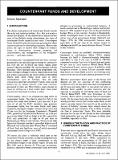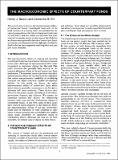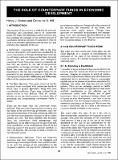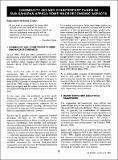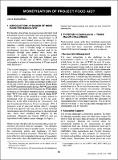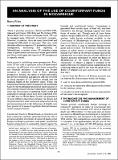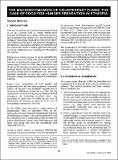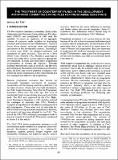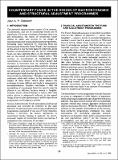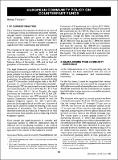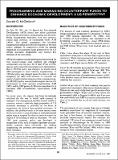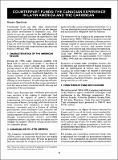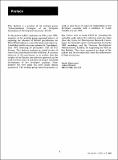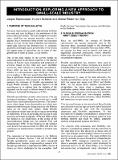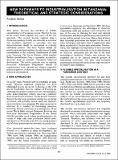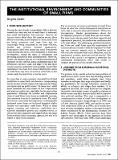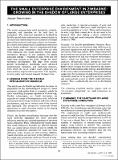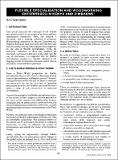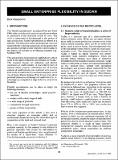Volumes 21 - 30: Getting Institutions Right for Women in Development: Recent submissions
Now showing items 101-120 of 444
-
COUNTERPART FUNDS AND DEVELOPMENT
(Institute of Development Studies, 01/04/1992)Summary Counterpart funds play an important, growing and often controversial role in developing countries. The Bulletin reviews the issues and connects counterpart funds to wider themes in development: poverty targeting, ... -
NEGLECTED ISSUES IN THE COUNTERPART FUND DEBATE
(Institute of Development Studies, 01/04/1992)Summary The article reviews the current conventional wisdom on counterpart funds and discusses four neglected issues: sectoral and commodity disaggregation; inter?annual variability; fiscal and import dependence; and ... -
THE MACROECONOMIC EFFECTS OF COUNTERPART FUNDS
(Institute of Development Studies, 01/04/1992)Summary This article discusses the major macroeconomic effects of counterpart funds. These include their effects on the money supply, the balance of payments, government finances, and inflation. While the macroeconomic ... -
THE ROLE OF COUNTERPART FUNDS IN ECONOMIC DEVELOPMENT
(Institute of Development Studies, 01/04/1992)Summary This article considers the basic question of whether the creation and use of counterpart funds make a significant contribution to the development of aid receiving countries. In a country with an inexperienced ... -
COMMODITY AID AND COUNTERPART FUNDS IN SUB?SAHARAN AFRICA: SOME MACROECONOMIC ASPECTS
(Institute of Development Studies, 01/04/1992)Summary Commodity (especially food) aid, counterpart funds from recipient sale of external aid (commodities or import support forex) and the macroeconomics of structural adjustment in sub?Sanaran Africa have become an ... -
MONETISATION OF PROJECT FOOD AID?
(Institute of Development Studies, 01/04/1992)Summary Project (both development and emergency) food aid aims at increasing household food security of selected beneficiary groups, and has for this reason traditionally been provided strictly in kind. Monetization, i.e. ... -
AN ANALYSIS OF THE USE OF COUNTERPART FUNDS IN MOZAMBIQUE
(Institute of Development Studies, 01/04/1992)Summary While there is increasing consensus on how counterpart funds can be managed more effectively, there remain many procedural and managerial difficulties to overcome. Using recent experience with counterpart funds ... -
THE MACROECONOMICS OF COUNTERPART FUNDS: THE CASE OF FOOD FOR HUNGER PREVENTION IN ETHIOPIA
(Institute of Development Studies, 01/04/1992)Summary The article explores the scope for monetizing food aid to set up a special fund to finance famine?relief activities in Ethiopia. In macroeconomic terms, food aid sales in good years to create a fund must not create ... -
THE TREATMENT OF COUNTERPART FUNDS IN THE DEVELOPMENT ASSISTANCE COMMITTEE'S PRINCIPLES FOR PROGRAMME ASSISTANCE
(Institute of Development Studies, 01/04/1992)Summary The Development Assistance Committee (DAC) of the Organisation for Economic Cooperation and Development (OECD) has adopted Principles for Programme Assistance which include guidelines for the treatment of counterpart ... -
COUNTERPART FUNDS IN THE DESIGN OF MACROECONOMIC AND STRUCTURAL ADJUSTMENT PROGRAMMES
(Institute of Development Studies, 01/04/1992)Summary The article draws attention to the importance of including counterpart funds (CF) in the design of adjustment programmes. After providing an overview of programmes supported by the IMF and describing the donors' ... -
EUROPEAN COMMUNITY POLICY ON COUNTERPART FUNDS
(Institute of Development Studies, 01/04/1992)Summary This article reviews the evolution of Community policy and practice on counterpart funds (CF) generated by food aid and, more recently, by import programmes in favour of adjusting countries. The new instrument ... -
PROGRAMMING AND MANAGING COUNTERPART FUNDS TO ENHANCE ECONOMIC DEVELOPMENT: A US PERSPECTIVE
(Institute of Development Studies, 01/04/1992)Summary In 1991 the US Agency for International Development (AID) issued new policy guidelines governing the generation, programming, and accountability requirements associated with host country?owned local currency, or ... -
COUNTERPART FUNDS: THE CANADIAN EXPERIENCE IN LATIN AMERICA AND THE CARIBBEAN
(Institute of Development Studies, 01/04/1992)Summary In Latin America and the Caribbean, Canada has supported recipient country efforts to implement tough economic reforms. There has been considerable debate within Canada on the impact of these reforms on the ‘poor’ ... -
Preface
(Institute of Development Studies, 01/07/1992) -
Introduction: Exploring a new Approach to Small?Scale Industry
(Institute of Development Studies, 01/07/1992) -
New Pathways to Industrialisation in Tanzania: Theoretical and Strategic Considerations
(Institute of Development Studies, 01/07/1992)Summary This article discusses the relevance of flexible specialisation in a Tanzanian context. The first section of the article draws together key aspects of the new approach. The second section suggests that a distinction ... -
The Institutional Environment and Communities of Small Firms
(Institute of Development Studies, 01/07/1992)Summary This paper argues that the main problem of small firms in LDCs is not their size but being isolated and powerless. It is not size as such that determines the development potential of small firms, but how they ... -
The Small Enterprise Environment in Zimbabwe: Growing in the Shadow of Large Enterprises
(Institute of Development Studies, 01/07/1992)Summary The article examines how small enterprises compete, cooperate, and specialise on the local level in Zimbabwe. The analytical approach is inspired by flexible specialisation and enterprise network studies in the ... -
Flexible Specialisation and Woodworking Enterprises in Kenya and Zimbabwe
(Institute of Development Studies, 01/07/1992)Summary This article discusses the relevance of the flexible specialisation thesis in the context of existing small and intermediate enterprises. First, the concept is discussed, and a working definition is proposed. ... -
Small Enterprise Flexibility in Sudan
(Institute of Development Studies, 01/07/1992)Summary This article analyses small enterprises in a Sudanese town through the flexible specialisation lens. Deteriorating macro?economic conditions during the 1980s have heightened the inefficiency of large enterprises ...

